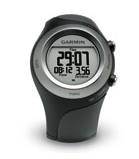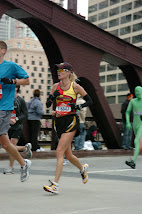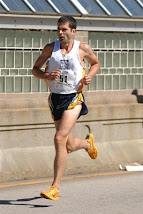Which prompted some interesting discussions with other runners in the following weeks. Boston really shouldn't sell out in hours--on that we all agreed. But, how do you make a correction so that Boston re-emerges as the "People's Olympics" type of event that it once was? While I have some ideas for that (fodder for future posts), the most common theme I heard from other runners was the standards were too easy for women.
It's hard to conclude anything other than, well, I really didn't deserve to qualify because I didn't work that hard for it.
Come to find out, this is a fairly widely held belief: "But there's another possible reason for the surging demand—one that has the potential to kick up a fair amount of controversy. It's the notion that the qualifying standards for women are too soft…. Some running experts say that one way to reduce excess demand for Boston slots would be to stop treating women like the gentler sex." (WSJ, It's Time for Women to Run Faster: Boston's Crowded Marathon Prompts a Gender War; Why Females Get an Extra 30 Minutes)
I'd like to debunk the myth that Boston's qualifying standards are disproportionately too easy on women, and that lowering the women's standards on their own won't solve the Boston entry problem.
More men than women qualify for and run Boston.

In Boston 2010 (the year I ran it), forty-two percent of the finishers were women.
In 2009, the total number of finishers of U.S. marathons and other road races were just about evenly split, men versus women.
If you assume that the same percentage of those who qualified actually run and complete the race, you can draw the simple conclusion, that about twenty percent more men than women qualified for Boston in 2010. Based on the national average of marathon completers versus Boston qualifiers, it actually appears that women may have it harder--even with the 30 minutes of additional time to qualify.
Yes, a 50-54 man has to run 5 minutes faster than an under-39 woman to qualify, but the average winning time of the 50-54M age group is 7:21 faster than the average winning time of the under-39F age group.
Too many women qualifying for Boston simply isn't the problem. Reading through some angry online forums that mostly bash on the "easy standards for women," I think IsleRoyaleRunner said it best: "The reason why it's [Boston 2011] anticipated to sell out in a matter of days has little to do with lowering the standard for women. There aren't 10,000 women running between 3:35 and 3:40. All the standards need to be lowered significantly if you want the race to be open past the 1st of the year."
Study after study has shown that the Marathon distance performance gap between men and women is between 11 to 12 percent:
"This is a fascinating result. Women actually do better, relatively speaking, in the shorter events, and the marathon is one of their worst distances compared to men." (Men vs. Women in Sports)
In their examination of performance in sports, women versus men, Astrand and Rodahl state "…In the marathon, women are 12% slower." They elaborate, "The women's running economy was poorer; that is, their oxygen uptake during running at a standard submaximal speed was higher. The heart rate, respiratory exchange ratio, and blood lactate concentration also confirmed that a given running speed resulting in higher physiological strain for the women." (Textbook of work physiology: physiological bases of exercise by Per-Olof Astrand, Kare Rodahl)
Due to key differences between men and women, women are at a distinct disadvantage for running the marathon:
"The marathon is simply not long enough to nullify the physiological advantages that men have in testosterone level, maximal oxygen consumption, and hemoglobin level. Given that over 99% of the energy used in the marathon is produced aerobically, women’s lower hemoglobin level (which mean women can transport less oxygen per unit of blood) is a distinct disadvantage." (Will Women Marathoners Catch the Men? Pfitzinger Lab Reports)
Women's blood carries 11% less oxygen for the same blood volume.
"It's obvious that males frequently achieve better performance times than similarly trained females. Part of the reason for this is that males routinely engage in a perfectly legal, natural form of 'blood doping.' The key male sex hormone - testosterone - promotes the production of haemoglobin, an oxygen-carrying protein found inside red blood cells, and testosterone also increases the concentration of red cells in the blood. The key female hormone - oestrogen - has no such effect. As a result, each litre of male blood contains about 150-160 grams of haemoglobin, compared to only 130-140 grams for females. The bottom line is that each 'male' litre of blood can carry about 11 per cent more oxygen than a similar quantity of female blood.
"Note how closely this 'oxygen gap' parallels the performance gap observed by Seiler and Sailer, who found a male-female performance difference of exactly 11 per cent in the 1980s - and 12 per cent today. Is this just a coincidence, or does the 11-per cent enhancement of blood oxygen in males produce the 11-per cent improvement in running speeds? Since oxygen is needed to furnish most of the energy required for endurance exercise, some scientists have suspected that the 11-per cent oxygen difference is the key factor behind male-female performance variation.
Exercise scientists Stephen Seiler and writer Steven Sailer mention in the May-June edition of the internet publication Sportscience News "two other key female 'deficiencies' - less muscle mass and smaller hearts than men, even after correction for smaller body size." (The Gender Gap 1: Women are getting slower; men are getting faster?)
Conclusion: The qualifying standard differences between men and women are probably about right.
 "Running USA, a research center based in Colorado, has collected raw data from nearly 500 marathons across the country that show a median gender difference of about 28 minutes in finishing times."
"Running USA, a research center based in Colorado, has collected raw data from nearly 500 marathons across the country that show a median gender difference of about 28 minutes in finishing times."Personally, I'd vote for lowering the standards across the board--for everyone. Allowing fewer women clearly doesn't solve the problem.
Note: I have added the distribution of male / female finishers for Boston 2010 in the image immediately to the left, for purposes of discussion. If anyone has the full data records of all 22K+ Finishers they'd be willing to share, please DM me in twitter.







